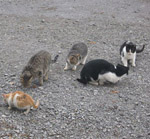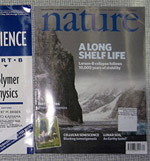Study links spearfishing with reef fish crisis
 Fish,
Fish,  Marine,
Marine,  Recreation
Recreation Spearfisherman hunting dogtooth-tuna off the coast of Ryu-Kyu Islands, Japan. Credit, Guy Keulemans.Spearfishing may be causing a crisis in certain reef fish populations according to the findings from a recent study published in Ecological Applications.
A research team lead by Natalio Godoy looked at the case of spearfishing in Chile where the activity is carried out both recreationally and by small-scale artisanal fishers.
Spearfishers in Chile frequently employ spearguns and breathing aids including SCUBA, snorkeling gear and hookahs (i.e. a system providing air from a boat).
Unfortunately, the lack of good data makes it difficult to monitor the effects of spearfishing in Chile and many other countries. To get around this problem, the researchers gathered data from some unconventional sources.
The scientists interviewed artisanal fishers and asked questions to help identify trends in reef fish populations. They also looked at the records from the world championship of sport spearfishing held in Chile in 1971 and 2004.
The researchers combined this information with existing catch data for several reef fish targeted almost exclusively by spearfishers. Together, the data from these three sources provide evidence that spearfishing has caused a decrease in reef fish size and abundance, along with a shift in composition towards smaller-sized species.
According to official statistics, total reef landings have decreased from around 900 tons/year between 1986-1990 to around 90 tons/year between 1998-2009. Over the years the catch composition shifted substantially for large carnivorous species towards smaller-sized omnivore and herbivorous fish.
In their interviews, the researchers questioned artisanal spearfishers of different age classes about the size, quantity, and types of fish they caught over the years
The authors write, "The collapse of the Medialuna ancietae fishery is particularly dramatic with the species being practically unknown to young generations."
The records from the spearfishing world championships in 1971 and 2004 provided further evidence of decline. Despite similar conditions at the two events the maximum size of fish and number of species caught decreased substantially.
"This study shows that unregulated spearfishing has depleted reef fishes in temperate near shore ecosystems along part of the Chilean coast and has also caused shifts in the composition of catches over time." The authors write.
"An urgent discussion on the banning of SCUBA and hookah-diving gear for spearfishing is necessary. Also, there is a need to improve reef fish landing statistics, add information on CPUE [catch per unit of effort] and to incorporate biological regulations on minimum fish size and total catch per diver."
--by Rob Goldstein
Godoy, N., Gelcich, S., Vasquez, J., & Castilla, J. (2010). Spearfishing to depletion: Evidence from temperate reef fishes in Chile. Ecological Applications DOI: 10.1890/09-1806




Reader Comments